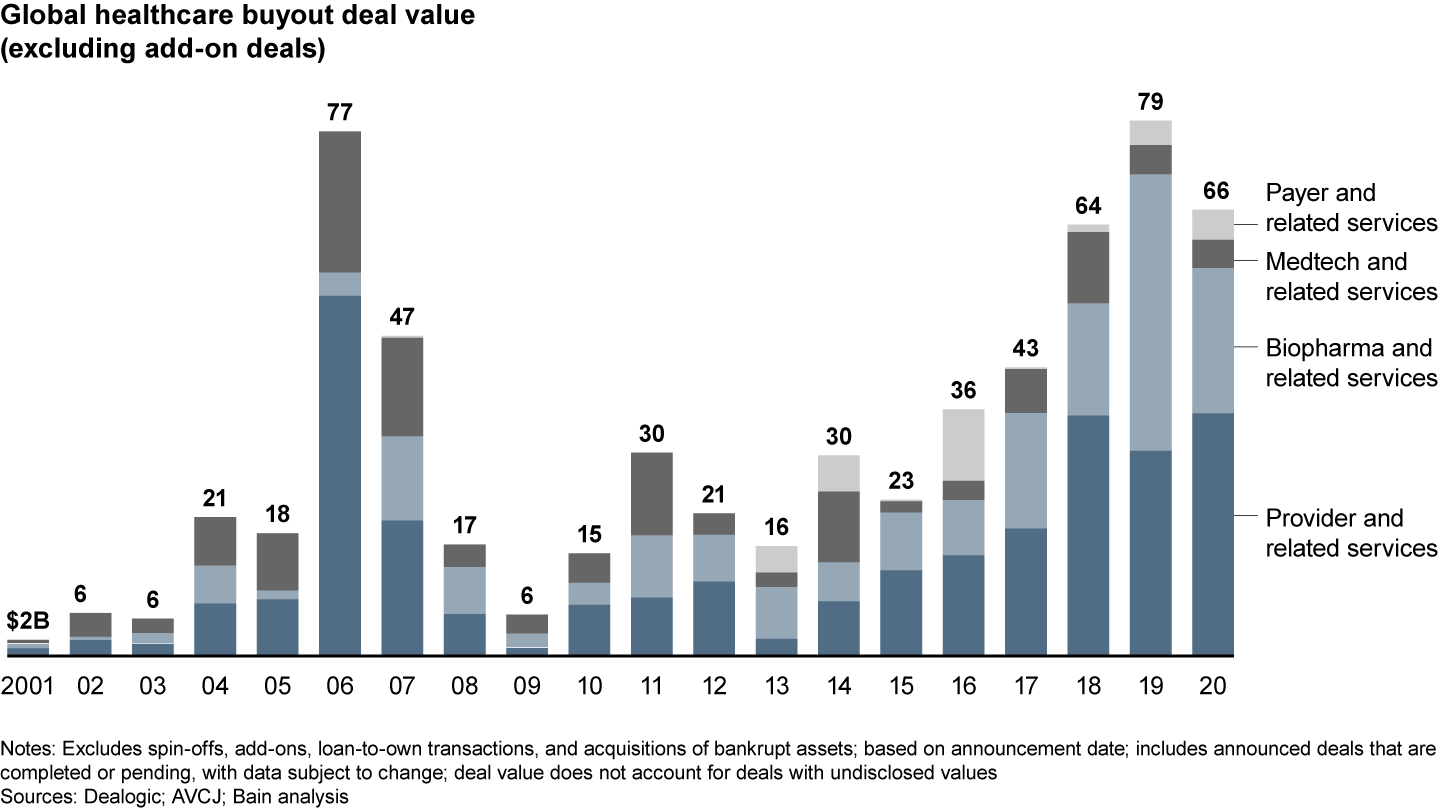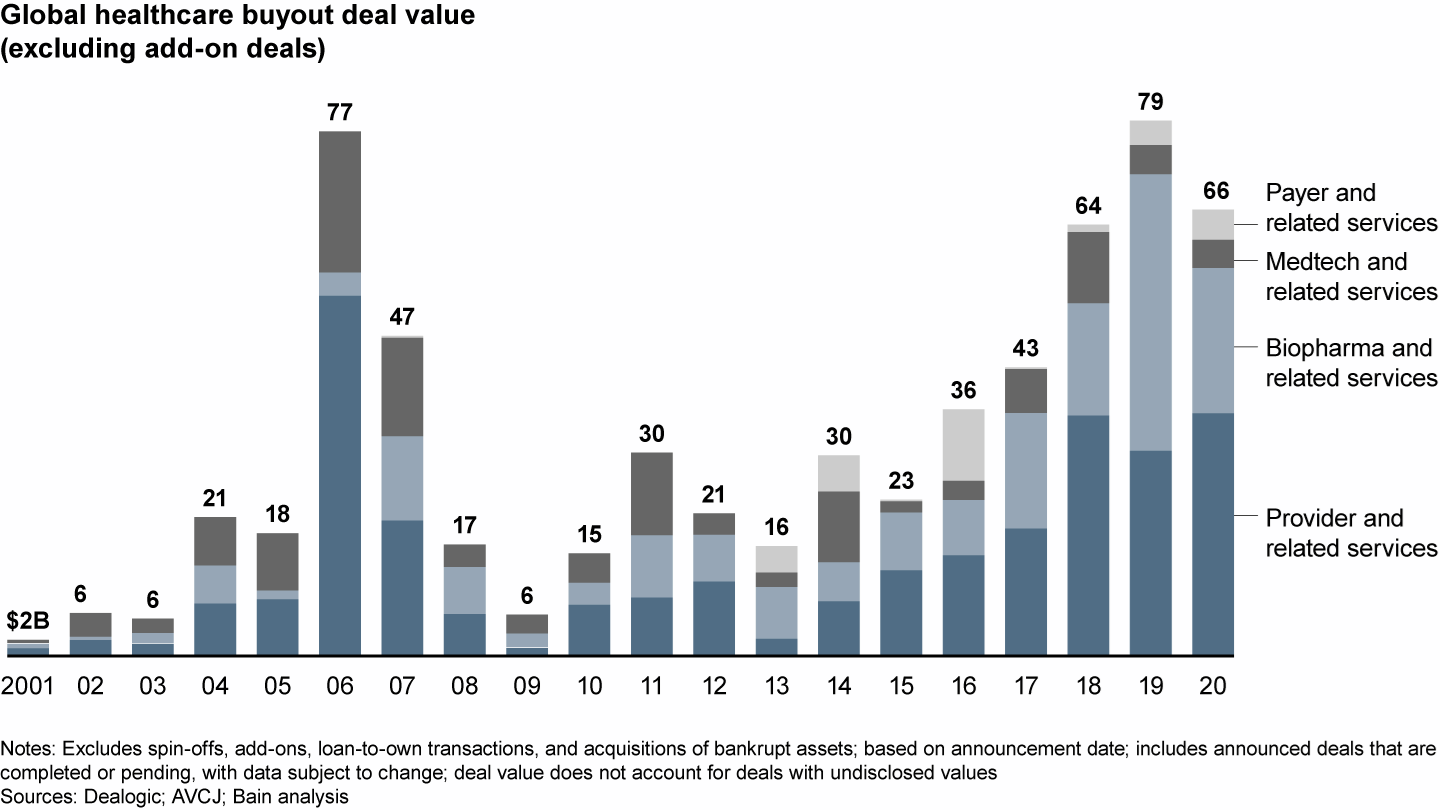Report

In evidenza
- Healthcare IT deal counts and value dropped modestly due to the effects of Covid-19 and lockdowns. But enthusiasm for technology’s support in shaping healthcare delivery, innovating R&D, managing healthcare payments, and reducing costs keeps growing.
- Private equity investors sought companies that use technology to help patients find the right site of care, improve outcomes, and achieve a better experience at lower cost. Telehealth will enable companies to meet patients where they are, with opportunity for the space to evolve and solutions to converge.
- The use of big data analytics to raise the efficiency of biopharma clinical trials also garnered interest from healthcare investors. Clinical trials will likely become more data rich and collaborative, unlocking unprecedented innovation in drug development.
- We anticipate that healthcare IT deal activity will return to or exceed prepandemic levels, given advances in technology and data analytics, and the growing conviction among healthcare leaders about the power of technology to improve clinical workflow and operational efficiency, reduce excess cost, and improve health outcomes.
This article is part of Bain's 2021 Global Healthcare Private Equity and M&A Report.
Healthcare IT spans all sectors, so it’s no surprise that Covid-19 affected private equity investment in 2020. Deal count dipped to 48 from 51 deals in 2019. Disclosed value declined to $15.1 billion from $17.5 billion the year earlier (see Figure 1). Veritas’s $5 billion acquisition of DXC Technology’s State and Local Health and Human Services businesses represented almost one-third of total disclosed value in the sector.
Disclosed deal value dropped from the 2019 high


Still, healthcare IT accounts for 23% of total disclosed value across healthcare buyouts. Meanwhile, several notable deals did not disclose value, including the Warburg Pincus partnership with existing investor Great Hill Partners to invest in Quantum Health.
Four major themes dominated healthcare IT investment in 2020, with investors showing interest in technology that:
- facilitates healthcare provider care across sites as employers, healthcare payers, and patients push care outside of hospitals and long-term care facilities;
- helps employers improve member experience and outcomes while reducing cost;
- uses analytics to shape better patient experiences; and
- deploys big data analytics to modernize clinical trials.
Meet the members of Bain’s Healthcare Private Equity practice.
Facilitating provider care at alternate sites
The pandemic accelerated the trend away from inpatient post-acute care settings, such as skilled nursing facilities, long-term acute-care facilities, and hospitals. This occurred because Covid-19 increased the risk of contracting a fatal infection in these settings, and patients already preferred lower-acuity settings, such as home and ambulatory care, for quality-of-life benefits, while healthcare payers push to these sites given their lower cost of care. This trend created opportunities for healthcare IT solutions that support care within post-acute and home care settings and that help to manage the transition between them.
WellSky, a post-acute electronic medical record platform that received a $1.5 billion investment from TPG and new capital partner Leonard Green, illustrates this trend. Investors believe WellSky can grow by serving healthcare providers in every setting of care, managing the transition across settings, and bending the cost curve, by leveraging its technology and analytics. WellSky aims to get patients to the right setting at the right time, through patient guidance offerings and the potential for a broad post-acute-wide electronic medical records solution.
Helping employers improve outcomes at lower cost
Employers have been seeking solutions that offer their workforce improved health outcomes and experiences while reducing their overall cost burden. Over the past year, more healthcare private equity investors targeted companies that can demonstrate a clear employer ROI, a trend we expect to continue. Quantum Health was one such deal (see the Payers section of this report), and Grand Rounds, with investment led by The Carlyle Group, was another tech-enabled firm focused on care coordination. Similarly, Teladoc’s acquisition of Livongo reinforced the strong corporate interest in using care management platforms to reduce employer healthcare costs.
The pandemic has forced more healthcare providers and patients to try telehealth, and they generally like its convenience, clinical and operational efficiency, and ability to facilitate high quality care. Three of the four “see any doc” telehealth platforms—Dr. on Demand ($75 million from General Atlantic), MDLive ($50 million from Sixth Street), and AmWell ($100 million from Google Cloud)—received investment. We expect the enthusiasm for telehealth investing to continue after the pandemic, given patients’ even greater preference for “see my doc” platforms.
Questions remain about the future of care delivery, and whether and how solutions will converge. Technology allows companies to meet the patient where he or she is. Looking ahead, where will care take place? How much care will be delivered digitally? What is the role of digital in triage? How can technology enable remote monitoring in the home and push more cutting-edge models such as hospital at home? Investors will look for answers as they search for the next generation of care delivery assets.
Using analytics to shape better patient experiences
Healthcare payers and providers have embraced data systems and advanced analytics in an effort to improve patient experiences at reduced cost. They employ these technologies to target revenue capture (through mechanisms such as improved hospital coding accuracy), value-based performance (through better clinical documentation), and payer operations (through analytically informed insights on health plan performance and patient outcomes).
Healthcare performance analytics firm MedeAnalytics, for instance, was acquired by JLL Partners to better equip payers with data insights on enterprise analytics, payer operations, and value-based care. Also, Frazier Management acquired Accuity Delivery Systems to drive improved clinical coding and revenue integrity systems for providers.
Another application for big data, population health management, allows healthcare payers to introduce plans to otherwise expensive patient populations and to lower the payers’ administrative and medical costs. For instance, Accountable Healthcare America, a technology-enabled population health management platform for Medicare Advantage-focused networks, entered into a merger agreement with GreenVision Acquisition, a special purpose acquisition company, for $177 million.
Deploying big data analytics to modernize clinical trials
Covid-19 forced biopharma firms to employ decentralized approaches in clinical trial execution so as to decrease dependence on in-person visits for collecting data. These solutions also have the potential to speed up trials and get products to market faster. In addition, private equity investors are exploring the use of real-world evidence, which allows firms to expand into new indications through Phase 4 trials and to negotiate more advantageous formulary tiering with healthcare payers.
For example, Clinical Ink, acquired by GI Partners, has developed novel clinical trial workflow solutions that capture and integrate electronic study data from sites, clinicians, and patients in real time. In addition, TriNetX, with a majority stake acquisition by Carlyle, operates a platform of real-world data, spanning hospitals, pharmaceutical companies, and contract research organizations, which is used across the drug development cycle.
We anticipate growth in virtual clinical trials. Certara, owned by EQT and Arsenal Capital Partners, went public in 2020, and is one example of a large data asset that enabled rapid assessment of Covid-19 clinical outcomes. R&D looks primed to be more data rich and collaborative, with a question around the right blend of online and offline models in order to achieve successes on the order of the recent pandemic vaccine timeline.
Technology branches out
Healthcare IT deal activity will likely persist and accelerate after the pandemic, given the enduring need for technology-enabled solutions to critical healthcare issues. Coordinating the patient’s journey across settings, executing increasingly virtual clinical trials, and developing revenue platforms for healthcare providers facing lower patient volumes are complicated issues that all benefit from advanced technologies, and that will fuel deals.
For instance, several of the crossover growth private equity funds, including Coatue, Tiger, Dragoneer, and ICONIQ, are underwriting potential buyout targets—Oscar, Hinge Health, Qgenda, and so on.
We also expect to see platform plays in revenue cycle management and payments as technology firms look to streamline transactions and payment flow between healthcare stakeholders. One example from 2020 was the acquisition of eSolutions by Waystar for $1.3 billion. With this acquisition, Waystar (backed by EQT, CPPIB, and Bain Capital) takes a better position to unite government and commercial healthcare payers on a single platform with eSolutions’ Medicare-specific revenue cycle technology.
An open question remains on the future of healthcare payments. There is increasing pressure to manage and digitize the $500 billion of paper-based payments. Further, it is not clear whether payments in healthcare will advance as far as other industries, because of healthcare’s complexity and multitude of line items. Any simple, elegant solution will have to overcome this complexity.
Finally, investors should keep an eye on nascent behavioral health technologies. Round 13 Growth Fund invested $42 million in LifeSpeak, providing an early signal of activity in the segment. Covid-19 has amplified mental health problems, bringing to the forefront for employers, payers, and providers alike the imperative to deliver effective mental health treatment to patients when and where they need it. Tech-enabled and telehealth-augmented behavioral health models abound, and the space is wide open and ripe for disruption.
More from the report
-
Welcome Letter: Fertile Conditions for Healthcare Private Equity Investment
-
Healthcare Private Equity Market 2020: The Year in Review
-
The Covid-19 Paradox: Widespread Repercussions for Demand, but New Healthcare Investment Opportunities as Well
-
Healthcare Private Equity in North America: Bring On the Gem Assets
-
Healthcare Private Equity in Europe: Steady Dealmaking despite Many Deferrals
-
Healthcare Private Equity in Asia-Pacific: Riding a Wave of Domestic Innovation
-
Healthcare Providers: New Roll-Up Candidates and a New Look for Risk-Bearing Providers
-
Healthcare Payers: A Bid to Reduce Costs for Patients and Employers
-
Biopharma: Commercialization Support Services Are Thriving
-
Medtech: Four Themes Fueled Deals despite the Pandemic
-
Healthcare IT: Technologies Help Improve Patient Experiences at Lower Costs
-
Healthcare M&A: A Pandemic-Induced Slowdown in Every Sector
-
Healthcare Exit Activity: Robust Capital Markets Spur a Surge of IPOs
-
Healthcare Private Equity Outlook: 2021 and Beyond